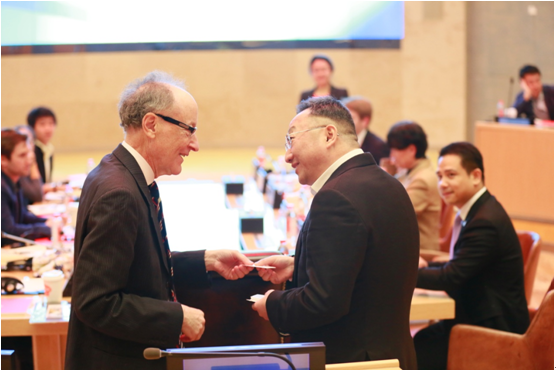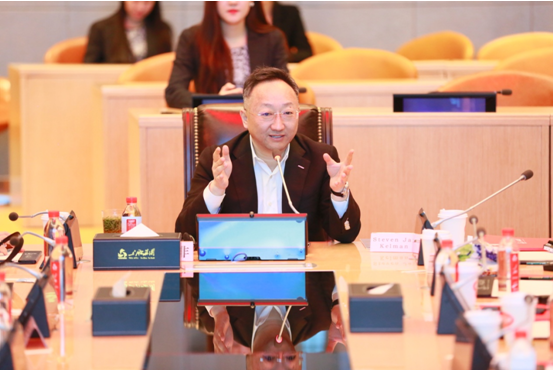Harvard student delegation visits Sanpower Group
Time Published:2016-03-28Source:Author:
Browse:0 Print
Font Size:LargeMediumSmall
Rising Chinese private enterprises are influencing the world economic pattern, and many of them have been included in teaching cases used at the Harvard Business School. This shows strong interest by the elite of Harvard University in the social and economic development of China. “Harvard in China”, sponsored by the Harvard Kennedy School and World Youth Development Forum, has been on-going for more than ten years. This delegation visited several departments including the State council, the Ministry of Foreign Affairs and the Ministry of Commerce and was received by Liu Yandong, Ma Kai, Zhou Xiaochuan,etc.
On 15 March, a delegation of 30 students from Harvard’s Kennedy, Business, Law, and Medical Schools and other schools in 14 countries, led by Professor Steven Kelman, visited Sanpower Group, the first stop of this year’s China tour. Yuan Yafei, Chairman of Sanpower Group, had friendly discussions with the Harvard students, who were escorted by Wu Gang (Vice President of the Group), Nie Lei (Vice President), and Cui Chunlan (Assistant President).
During this tour, the Harvard students visited the corporate culture “Sanpower Home” showroom, where the development history of Sanpower Group and development of the five-strategy module was explained. The students took notes, asked questions and tried hard to deepen their understanding of the Sanpower Group.
These students were quite surprised to learn that Sanpower had acquired Brookstone, a very well-known novelty brand in the USA. They tried the racing game and deck chairs in Sanpower Brookstone concept store and had a lot of fun.
The large screen at the front of the Ageing Service Command Centre presented them with a remote service model of senior care and medicine.
At a later meeting, Wu Gang explained Sanpower’s International strategies and experience of recent years to the students. Professor Kelman expressed his thanks to Chairman Yuan Yafei and said he was honored to have taken part in the visit.
In the interaction, students continuously raised their hands to ask questions and Yuan Yafei answered them all in English:

Question 1 by Professor Steven Kelman: What businesses, started with the establishment of Sanpower Group, still exist today, please?
Yuan Yafei: Twenty-three years ago, I left my government position and experienced the golden age of turnaround development of the Chinese economy. I started the business from nothing by selling computers and today there are almost 3,000 3C stores in China, after twenty years of development. It was the extraordinary development of the Chinese economy that contributed to this continuous growth and the innovation and miracle of Chinese private enterprise. The 3C business still plays an important role in Sanpower and we have never stopped its development and upgrading. Sanpower Group completed the M&A activities of Brookstone in 2014 and brought in its mature products innovation model and professional supply chain. We also took the opportunity to promote a synchronous transformation for Hiteker and Funtalk Telecommunications, both of which belong to Sanpower Group. The R&D, supply chain and operations and management capacity have also been greatly enhanced.
Question 2: How does Sanpower Group decide development strategy? And how does Sanpower find future competitive business?
Yuan Yafei: “When everybody does the same thing, you can leave!” Several years ago, I personally decided to start in the senior care business. I knew it will be a huge market because of the ageing society in China. Sanpower has An Kang Tong, the most professional homecare service corporation in China, and Natalie, the largest senior care service corporation in Israel. We also have Nanjing Cenbest which has become the largest cord blood bank enterprise in the world. During the 13th Five-Year Plan, some organisation predicted that the size of the “Health in China” market would rise to 10 trillion Yuan. It’s an accurate judgment. The customers and the tendency and the business concept of “Not to be a follower to become outstanding” is what enables Sanpower to firmly grasp opportunities during growth and to maintain a leading role.
Question 3: Traditional retail business all around the world is facing the challenge of e-commerce and online shopping. Many enterprises have lost their appeal. What should they do to bring customers to offline stores?
Yuan Yafei: Online shopping is quick and convenient for customers and will replace those offline business models which simply aim to meet the needs of material consumption. The offline business model which meets the needs of the spirit will survive. So, we will turn offline brick-and-mortar stores into “scenic spots” and try our best to provide our customers with “pleasure”. For example, the 167-year-old House of Fraser acquired by Nanjing Cenbest, which is also the British quintessential department store, and Orient Fraser, that will start its business in Nanjing this year, are going to introduce their house brands and own-bought business model. At the same time, they will bring in Hamleys where the core competitiveness of this 256-year-old toy shop will be scene setup and interaction. Salesman will tell jokes and play games with children to give the customers a unique and pleasant shopping experience.
The acquisition of well-behaved foreign businesses and enterprises and the introduction of their advanced operations and management systems, will enable Chinese business to take shortcuts and allow for quick turnaround and upgrades. “Future defines future” is our philosophical logic in business.
In his answers to the next 10 questions, Yuan Yafei, in a simple but profound way, analysed the importance of the transformation of the Chinese economy and the broad development prospect of future Chinese private enterprise. The Harvard student’s spokesperson noted that they had learned a lot from the Sanpower tour and had also developed a more positive view and understanding of Chinese economic development. They also looked forward to further exchange with Sanpower Group and would organise more top-notch student visits to China.
In addition to the Sanpower tour, student representatives of this “Harvard in China” delegation also visited the Ministry of Foreign Affairs, the Information Office and the Development Research Centre of the State Council, the Financial Management Committee of the Shanghai Free Trade Zone, the All-China Youth Federation, Alibaba.com, the People’s Daily, and Global Times.

Harvard in China: let more people know China
The “Harvard in China” program is sponsored by the World Youth Development Forum, which is a non-governmental non-profit organisation established by fellows of Harvard, Yale, Stanford, Oxford, Cambridge, etc. This organisation is devoted to increasing the exchange and dialogue among outstanding young leaders around the world.
Liu Xi, former chairwoman of the Chinese Students and Scholars Association, John F. Kennedy School of Government at Harvard University, joined Sanpower Group on her graduation, and she was also one of the sponsors of this activity. She presented the meaning of the “Harvard in China Program”. China is experiencing a process of Going Global and her role is becoming more and more important on the world stage. However, we meet many obstacles and difficulties because of prejudices and communication barriers. This delegation has a rigorous member selection process. When these young leaders enter American Society, they will spread their knowledge about China to people in all walks of life, let them know about China, and help build a favourable external appreciation of Chinese development.


